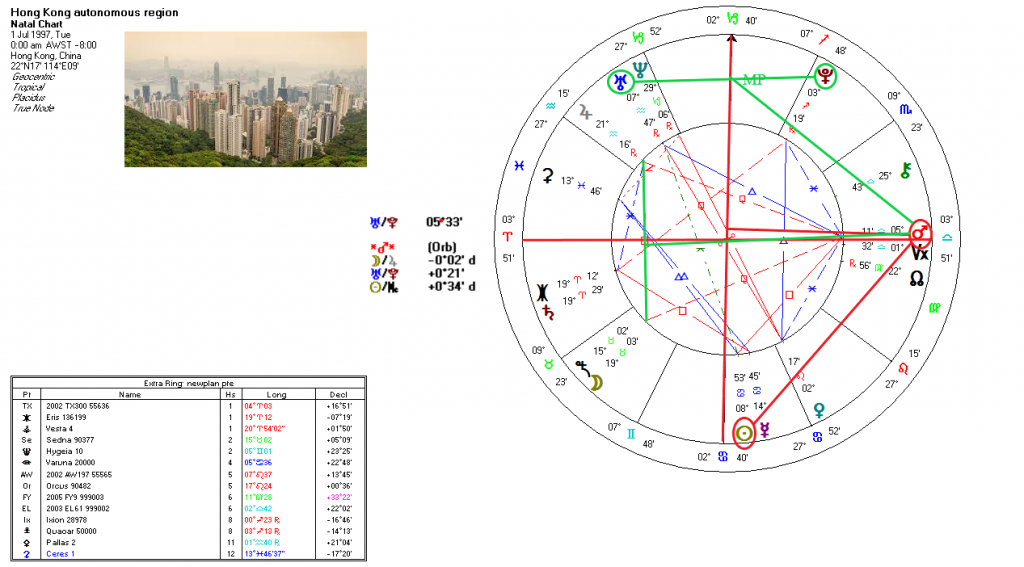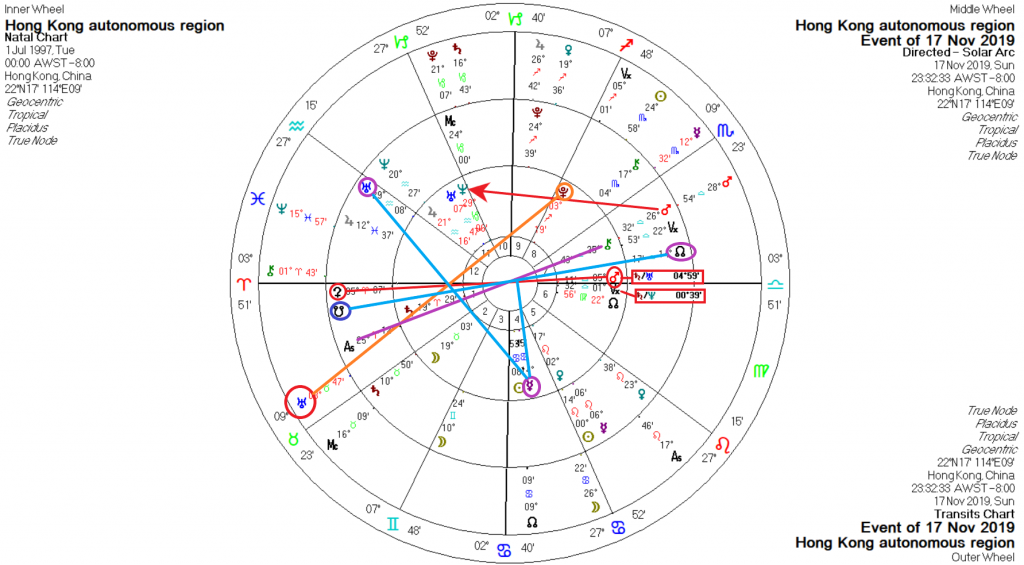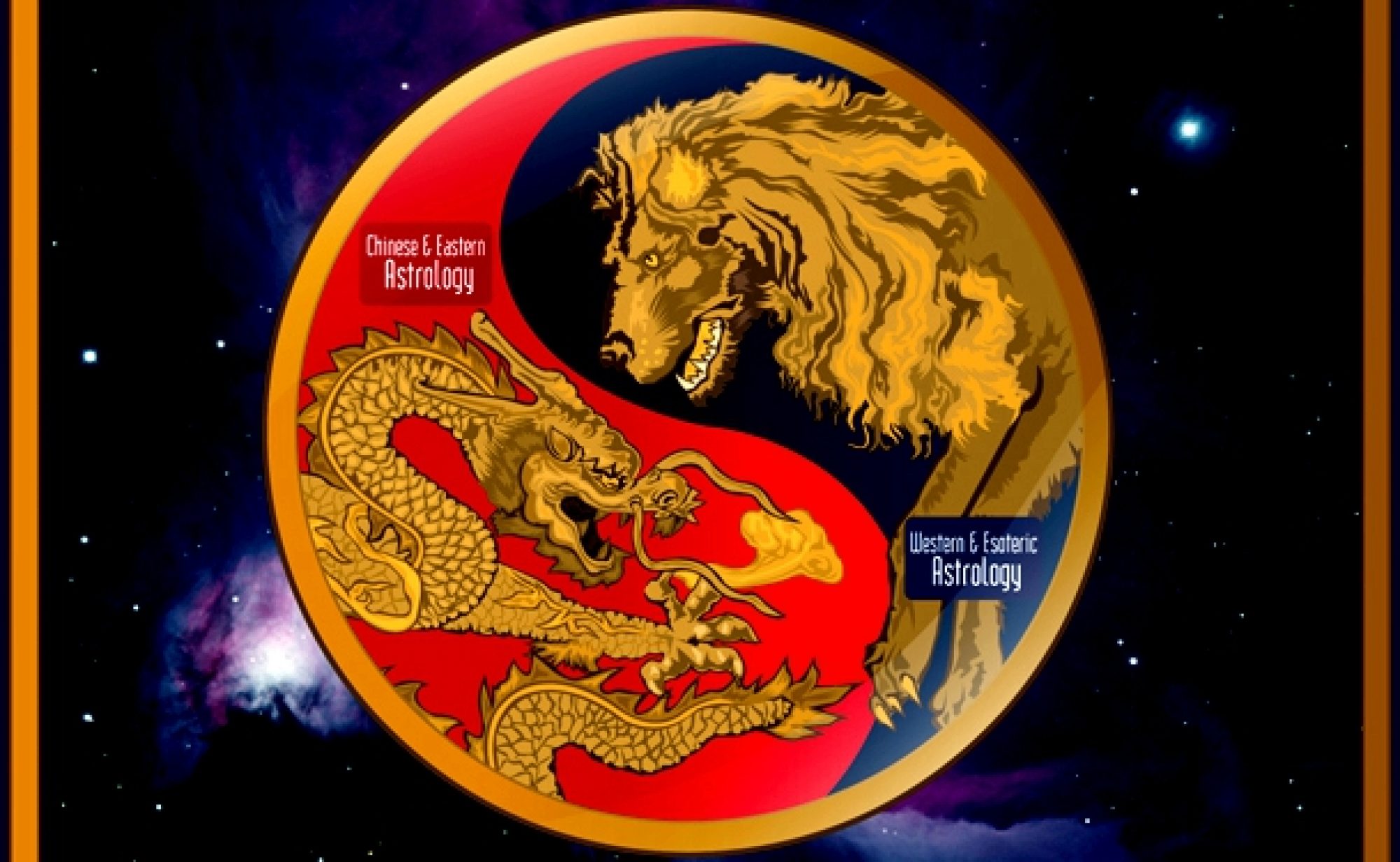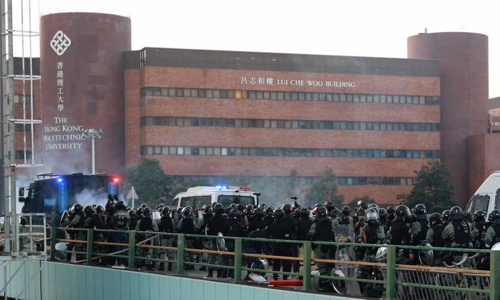Given recent news out of Hong Kong and given also we are approaching the Year of the White Rat, we will have a closer look at Hong Kong and what is likely to transpire there in the next few years. These are uncertain times for the island, and the violence we are seeing there, unfortunately, is part and parcel of the astrology of the autonomous region. As of this writing, there is a siege at the Hong Kong Polytechnic University (PolyU) and violence on the island has escalated sharply in the past few days. It puts one in mind of the Greek Polytechnic uprising 46 years ago, to the day. In this article we look a little deeper into Hong Kong and what lies ahead.
In the first article on Hong Kong we looked at some of the causes of the present protests, the history of the island and its handover from the British under the one-nation two-systems approach. We won’t go over the history again. Instead, we look a bit deeper in to the chart of the region itself. And some rather revealing facets present themselves. The chart of Hong Kong as an autonomous region of China is below (bigger):

The most immediate and indicative combination that stands out is the Mars conjunction with the Descendant, which also squares the Meridian axis. That in itself shows the struggles of the island, its sense of independence, its self-assertion in terms of its autonomy and its ability and penchant for fighting against any form of infringement on its liberties. But when we look a little deeper, certain other and contrasting factors present themselves.
Mars forms midpoint trees and rather close ones with Moon/Jupiter, Uranus/Pluto, and Sun/Midheaven, keeping in mind these also form aspects with all the angles by extension, including the Vertex. The Uranus/Pluto midpoint shows the revolutionary character of Hong Kong, especially in relation to the mainland, as it was the experiment that funnelled wealth into China and a big part of ‘socialism with Chinese characteristics’. This is a very powerful combination of factors. So, we look at the positive manifestations of these first.
The closest midpoint is Mars=Moon/Jupiter; great striving for success and a love of enterprise. It is also a combination that speaks of successful women and happy love relationships. Then, there is Mars=Uranus/Pluto, in the positive; fanaticism and the state of precipitation. (This midpoint is where the trouble lies, which we will get to.) Finally, there is Mars=Sun/MC: “Strong individuality, the energetic pursuit of one’s objectives, the urge to fulfil one’s mission at all costs, the making of personal decisions. – A powerful personality.”
Hong Kong has certainly exhibited all of the preceding characteristics at one time or another – but especially since the handover. The latter may seem paradoxical, but it goes to the root of the present problems. Here is the crux of the problem; Hong Kong was set up from the start of negotiations for the handover as a neoliberal, financial capitalist tax haven. It is one of the City of London’s secrecy locations, otherwise known as an offshore tax haven. Quite a lot of legitimate business has passed through Hong Kong, but by the very nature of its structure, it also invites corruption. And that is why we see the present problems there.
The current protests were a reaction against a criminal extradition bill, which really only made common sense, but which would have cut off an escape route from justice for any sort of criminal activity committed on the mainland. That immunity from extradition was a clause set in the terms of the handover. Extradition would also mean, though, that white collar criminals – people committing bank fraud, money laundering, shady financial dealings, etc. – would be subject to extradition as well as common criminals. There are also triads (Asian crime syndicates) in Hong Kong. The extradition law would have enabled a sweeping clean-up of corruption in Hong Kong. Some of the oligarchs and crime organizations on the island did not like what they saw in the extradition law.
Xi Xingping launched his anti-corruption drive on the mainland in 2012. By and large, those investigations and prosecutions did not extend to Hong Kong. But shortly after, we saw the ‘Umbrella Revolution’ (2014), which was a reaction against proposed changes in electoral laws, seen to be restrictive and “tantamount to the Chinese Communist Party (CCP)’s pre-screening of the candidates for the Chief Executive of Hong Kong”. There was no real political resolution to those protests, and resentment on all sides simmered underneath as a result. Those protests, like these, divided Hong Kong society, and like the present ones, they were enabled by students, but were likely also funded behind the scenes by others.
Remembering what we have regarding Mars and the associated midpoints, any hint of perceived restriction of Hong Kong’s autonomy by the mainland evokes a strong reaction from the younger sectors of the populace. The underlying fear is that the CCP will come in and wipe away any freedoms that Hong Kong has enjoyed since the handover. But this ignores the way the people of Hong Kong lived under British rule, covered in the last article on Hong Kong. The protesters have not studied their history, nor have they really sat down and taken an objective look at what has happened in the past decades.
When China opened itself to the West, Hong Kong was the financial gateway into the mainland. Hong Kong already had the banking system set up, had all the connections with the West and served as the financial clearing house for the mainland. As China grew in GDP and infrastructure, Hong Kong’s status gradually waned as the mainland established its own banks and connections. The year of Hong Kong’s greatest growth spurt was in 1976, at a rate of over 16% – unheard of in todays’ outlooks. Since then it has steadily declined in terms of percentage of growth, on average. Its current growth rate (as of 2018) is a fraction over 3%. So, what happened in 1976?
Nixon went to China in 1972 in an effort to normalize relations between China and the US, which had been on hold since the founding of the PRC in 1949. The real purposes of the trip were primarily twofold: to drive a wedge between the PRC and the Soviets (realpolitik), which was successful for a time, and to open the Chinese labor market to US corporations, which was wildly successful. Nixon called his week-long trip ‘the week that changed history’. It was indeed a landmark trip. It also led to unintended consequences, which we see in one way manifesting in the trade war between the US and China, and with the rapprochement between the Russian Federation and China. That’s another story.
After 1972 business relations between the US and China advanced very rapidly. In those days China was basically a third-world country, with widespread poverty. For instance, in 1980, over 80% of China’s people lived in extreme poverty. This was a poverty rate higher than that of India at the time. Since China opened itself to the world, really, that poverty rate has plummeted, to where it now stands at around 3%. The current rate in the US is around 11%. The raising of the living standards in China has been astounding since 1976. And the reason?
In 1975 Deng Xiaoping introduced what he was to call ‘socialism with Chinese characteristics’, overall a mixed economy with state ownership of the land and primary means of production, then taking the best models of the capitalists to enrich the nation. This was instituted under his program called ‘The Four Modernizations’, which reformed agriculture, science, industry and defense. It was a great experiment on a grand national scale. For the capitalist investment, Hong Kong was the key outpost. Even now, Hong Kong accounts for about 60% of capital inflow and outflow from China. It is still an important economic center for China, hence the reticence of the CCP to interfere in the protests there. But even then, Shenzen and Shanghai are due to overtake and replace Hong Kong as the key financial hubs for China.
To get to the essence of why we are seeing the violence in Hong Kong we need to go back to the realpolitik of Henry Kissinger, Brzezinski and the like. The original idea of taking China on board with the West was the split China and Russia, knowing that if the two ever combined in real fashion, as they are doing now, it would eventually spell the end of Western control over the world’s finances, and thereby geopolitical control. Truth be known, this was one of the ideas behind Trump’s desire for rapprochement with Russia, aside from his business interests there. Kissinger has been an advisor to Trump from time to time. And now we get to the point.
Since Russia and China have combined their interests in presenting a united front for Eurasia, the emphasis in Washington and London in particular has shifted from Russia, since Russia cannot be subdued, to China. China is to become the world’s leading economy next year. Hence we see the Western efforts to ‘encircle’ China and to somehow cut it off from the advances it has made under the Nixon/Deng model. It is the reason for the trade war and it is partly behind the protests in Hong Kong – as an effort to hobble the interface between China and the greater world markets. What is not realized on the part of Western interests, though, is that even if such a plan were to succeed, it would represent only a temporary setback. It would be a case of too little, too late.
There is indeed a plan behind the current violence. When the peaceful protests failed to win the day, the next phase of the operation went into effect, called the ‘marginal violence theory’. It runs something along the lines of using aggressive tactics against the police without resorting to outright violence in order to evoke a violent response by police, thus eliciting (they hope) public and international outrage against the authorities and thereby support for the protesters. It was outlined in a recent Grey Lady op ed piece. But that didn’t work, either. The police were onto the tactic and practised restraint. The violence escalated thereafter to the point we see today. What do we see in the current Hong Kong chart, then? The chart with transits and directions is below (bigger);

The outstanding feature we see is the directed Mars a few degrees (and thus a few years) behind a square to Hong Kong’s Neptune, remembering that Mars is also the midpoint of the ‘revolution midpoint’, Uranus/Pluto. So, anything that is directed to Mars activates that midpoint, or by Mars is activated by it. As we saw in a recent article, that midpoint features in revolutions. Are we seeing a revolution in Hong Kong? We could say that anything is possible, but probable in this case? Not very likely. Will these protests disrupt the society? Well, they already have. Will they produce changes in Hong Kong. Very likely, but probably not to the liking of the protesters. The latter is indicated by the directed nodal axis and Uranus to Hong Kong’s Mercury, ruling services (including the police) and the media, as well as education.
Other indicators of the escalation in the violence are there. To start, there is the transit of Uranus quincunx Hong Kong’s Pluto, showing the suddenness of escalation, heightening uncertainty and signalling the collapse of an old order. Added to this, perhaps one of the more interesting is the directed Saturn/Uranus midpoint to Hong Kong’s Mars, which is quite descriptive of what is going on there: “An act of violence, the occasionally wrong use of extraordinary energy, undergoing great efforts and toil. – A violent or forced release from tensions or strains, the stage of challenging others for a decisive contest or fight. – Injury, accident, deprivation of freedom.”
There is also the directed Saturn/Neptune midpoint to Hong Kong’s Vertex, the so-called ‘illness axis’, which is showing the society there what ails it, at least for the more enlightened people there. And just what is it that is at the root of Hong Kong’s ills? It is basically economic, is fuelled by the oligarchs there who have jacked up rent and land prices to unheard of levels, and who also control the media, an altogether familiar story these days – in that ‘whosoever controls the narrative controls the populace’ – plus the waning fortunes of Hong Kong in general, especially since the 2008 financial crash. And now there is the trade war, which further puts a crimp in the cash flow through Hong Kong. The region is fast coming to the breaking point. What future lies ahead for the youth of Hong Kong, then, and the general populace? If the Neptune=Uranus/Pluto holds true, uncertainty, dissolution, unfulfilled wishes and a lot of frayed nerves.
However, there is another side to that revolution midpoint setup, and it is actually quite uplifting: “A sympathetic understanding of other people, the knowledge of human nature, deep study of a subject of special interest, the inclination to delve into the Supernatural Realms.” When that is exact in a few years, then that may well be in evidence.
However, we note too, that the other midpoints associated with Mars will also receive the Neptunian influence for this year, but only for this year; Moon/Jupiter – “A faint notion of happiness, the tendency to abandon hope easily, bad social conditions. – Dwindling happiness, losses and disadvantages through speculation or wastefulness.”. And Sun/MC – “The wrong attitude to life, the pursuit of wrong objectives, apathy, indifference, a weak will to live. – The experiencing of disappointments, confusion or lack of clarity.” In other words, it is not a very pretty picture there for the next year at least, but there is hope afterward. The positive aspects should be more in evidence when the Mars/Neptune direction is exact.
All told, this moment in Hong Kong’s history would appear to be a turning point for the island. And indeed, we do find the directed Ceres opposite Hong Kong’s Mars and thus conjunct all the Mars midpoints, showing a turning point, and we might say, a revolutionary turning point. There is one last thing to add.
We in the West do not understand China nor the Chinese, speaking in general. As a result, we project our Western ideals onto a culture and a nation that sees Hong Kong quite differently than do we. Many of us tend to see our own states in antipathy, whereas the mainland Chinese see Hong Kong as one of their own, but also as an important experiment, in the vein of a parent letting their child experiment with life. The protesters, on the other hand, are seen as radicals, Antifa, Hong Kong style.
We are conditioned to think that the Chinese will absorb and suppress Hong Kong as a result of the violence there, or even in general. If the latter were the case, they would have moved in the moment it was handed over. But Beijing learned some hard lessons from Tiananmen, and they are loathe to repeat them, and also to avoid the negative press it would generate, thus provoking capital outflow from the region and lost investment, not to mention the negative view of China in general it would generate. Yet, Hong Kong has existed as an autonomous region for 22 years now. It can still do so. And unless I miss my guess, the CCP would like to keep it that way, as it has been a great advantage to them up until now.
Without Hong Kong, the advances made in the mainland would have been much slower, if possible at all. And therein lies a hint as to why we are seeing the unsettled conditions there now. But any moves toward independence – i.e., as in an entity separate from China – will be quickly quashed. Hong Kong is Chinese, much as we may want to see it as a Western outpost. And inasmuch as the violence on the part of the police has been trumpeted through the media, their response has been very restrained. They have yet to apply Western or Middle Eastern methods to crowd control, such as we see in Iraq, now in Iran and in France.
The people in siege at the university are playing a losing game. How can they succeed, especially when there is growing antipathy toward them in the community at large? There have been 700 arrests since the day of this writing, with many more to come when the siege is broken. And that will probably happen without the PLA moving in. We feel for the people there, on both sides. The Hong Kong government, too, is in a very difficult position. It must restore order somehow. If the protests continue to escalate…well, we hope they don’t.
But for anyone hoping for greater independence and ‘freedom’ for Hong Kong, it could come, but it will be with Chinese characteristics. And yes, there is a form of democracy in China. Don’t believe it? Do a little research – outside of the Western press. There are plenty of Westerners who have lived and worked in China who have a very clear, yet different perspective than what our mainstream media tells us. Vietnamese, too. In the meantime, we hold the light for peace to come for Hong Kong, and for life there again to prosper.
After this, though, Hong Kong will not be the same. If it chooses to integrate with the mainland, it could be fabulously prosperous, like it was at the turn of this century. It is doubtful the protesters will win out. They can have all the financial backing they like, but the CCP knows full well what and who is behind the restiveness there. There will be changes made. That is to be expected. The violence there, instigated by the powers behind the scenes, foreign and domestic, cannot go unanswered.
Featured pic from Asia Times

